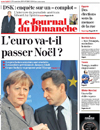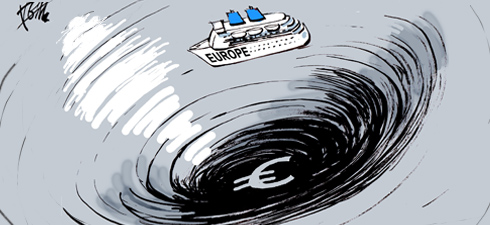“Will the euro make it past Christmas?” The question asked by the Journal du Dimanche is haunting the EU. The Paris weekly is passing on the catastrophic forecast of essayist Jacques Attali, who believes that the euro’s demise will come before the end of the year if the leaders “fail to look any further than their own election calendars.” There’s only “a month left to save the euro,” the newspaper writes -

After Greece, Ireland and Portugal, the deadly virus has spread to Italy. This week the over-indebted peninsula has had to borrow at exorbitant interest rates. On Friday, its creditors called for 7.8 % for a two-year bond, up 3.2 points from two months ago. [...] If the third-largest economy in the eurozone falls into insolvency, the monetary union will not survive much longer. [...] The tension is at its peak. On the eve of the weekend Standard & Poor's downgraded Belgium. Next Thursday, Paris hopes to sell between three and 4.5 billion euros in bonds – a real test, knowing that creditors have turned away from the still more desirable Germany. This week, Berlin wanted to raise six billion euros in the markets. It got only 3.6 billion. A surprise. – Le Journal du Dimanche
“The euro crisis and the debt crisis have reached a milestone destined to leave its mark on the European economy and even the constitutional structures of the continent,” writes Corriere della Sera:
In a few weeks, nothing will be as it was before, but no one has any certainty that everything will pass off as set out in the schedule being drawn up [...]. Tomorrow, Italy will have to face a very delicate issue of debt securities. On the same day, the Eurogroup will review the French and (primarily) German proposals on what German Chancellor Angela Merkel calls the fiscal union. [...] These changes – if all goes to plan – will be ratified at the EU summit of December 9. The day before then, the ECB will decide on offering unlimited liquidity for two or (more likely) three years to pump oxygen into the banks. At the same time, Italy’s prime minister Mario Monti should have presented his ministers with measures to stabilise Italy. Everything will be in place for the ECB to act. The bank could signal differential thresholds for sovereign debt securities [the difference between the lowest and highest interest rates on government bonds], beyond which the bank would make unlimited interventions in the markets. In any event, however, the thresholds will be high enough to compel the states to do their part in lowering rates. This is the way to get through the crisis. Europe is now preparing to do just that, knowing that it too often in the past it has got lost on the way. – Corriere della Sera
Noting that Angela Merkel and Nicolas Sarkozy “want to bring Monti into the agreement to modify the EU treaties”, La Stampa leads with “Pact of Three for Europe: full support, but speed up reforms”. Writing in the Turin daily, the economist Franco Bruni finds that -
... the difficulties of the Italian debt seem to have become the main problem in the global economy. This may be an exaggeration. The excess of drama is typical of some phases of financial crises, especially when the adjustment measures and reforms face political and social hurdles. The excessive dramatisation also extends to the ongoing discussions about the end of the euro, where those talking don’t know what they’re talking about and don’t understand that this would solve nothing and hurt everyone. – La Stampa
A “countdown” is also the image used by La Tribune:
Tick-tock, tick-tock.... The ticking clock that is measuring out the survival of the euro ticks implacably on. ... Officially, Germany remains opposed to a more extensive intervention by the ECB. At the rate the crisis is developing, this stubborn refusal resembles the behaviour of a firefighter who lets a house burn to teach children the dangers of playing with matches. – La Tribune
In Madrid, El Economista is wagering on a collapse of the euro area into two separate zones: one for the most virtuous countries, and one for the most fragile. It will be, moreover -

... Merkel [who] will select the nine countries that will create the ‘super-euro’. The Chancellor wants an agreement to be signed, country by country, on a new stability pact that will resemble the mechanism of the Schengen Agreement. The number nine, in fact, under EU rules, is the minimum number of countries that can reach agreements of enhanced cooperation amongst themselves. Merkel is satisfied with this formula for two obvious reasons: time and the simplicity of putting it into practice (…). The agreement could be in place by January or February 2012, a period that is positively meteoric in its brevity when compared to that required to change a treaty, which is never less than a year.... Italy and Spain would be included in the club. Having them in is vital to both countries, as they would then have the ongoing support of the ECB – not to mention that this would avoid a division between North and South. – El Economista
In Berlin, Die Welt foresees “elite sovereign bonds” backed by Germany: “Six countries in the euro area with the highest credit rating (Triple A), will create common treasury bills, interest rates on which, in the most positive case, will be from 2.0% to 2.5%.” In its editorial the German daily takes the view that -
... the markets are demanding a credible sign that the euro-sinners will not be able to carry on as before.... The new agreements, whatever they look like, will get across that message. It’s Merkel’s iron hand holding sway in Europe now. – Die Welt
Was this article useful? If so we are delighted!
It is freely available because we believe that the right to free and independent information is essential for democracy. But this right is not guaranteed forever, and independence comes at a cost. We need your support in order to continue publishing independent, multilingual news for all Europeans.
Discover our subscription offers and their exclusive benefits and become a member of our community now!












